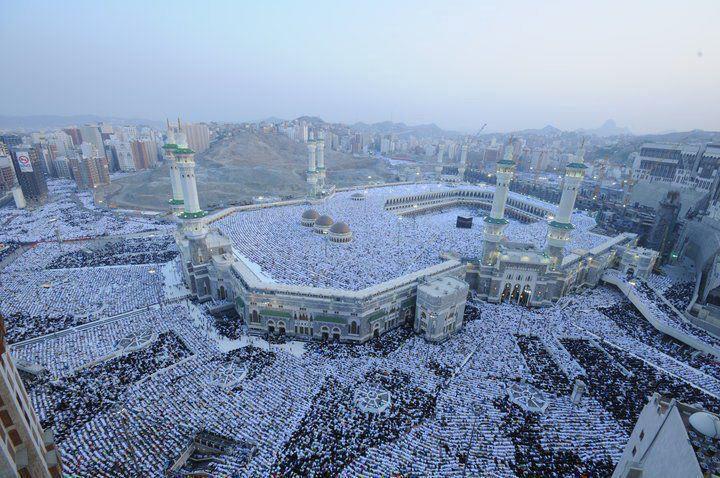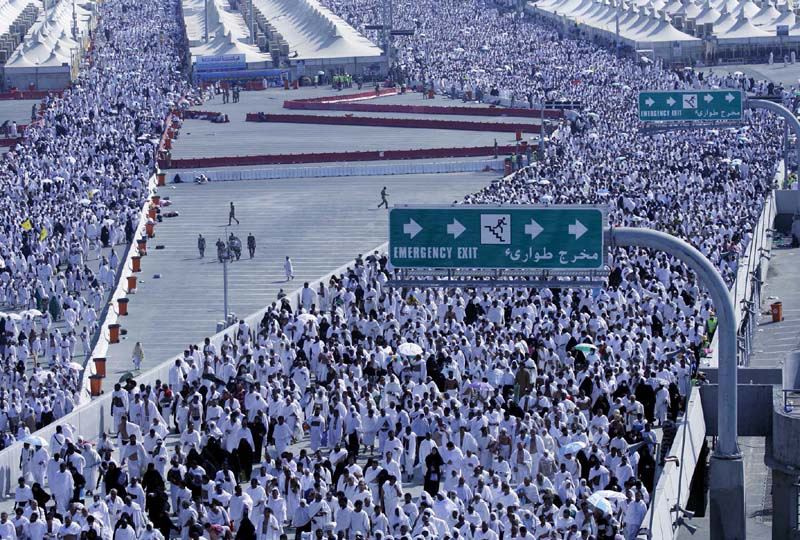The Hajj & Eid al-Adha VIA Boston.com
“And be patient, [O Muhammad], for the decision of your Lord, for indeed, you are in Our eyes. And exalt [Allah] with praise of your Lord when you arise.” [52:48]
The Messenger of Allaah (صلى الله عليه وسلم) said:
‘The days of al-Tashreeq (11th, 12th and 13th of Dhul Hijjah) are the days of eating, drinking and remembering Allah’
[Muslim]
Eid al-Adha (Arabic: عيد الأضحى ‘Īd al-’Aḍḥá,”feast of sacrifice”) or “Festival of Sacrifice” or “Greater Eid” is an important religious holiday celebrated by Muslims worldwide to commemorate the willingness of Abraham (Ibrahim) to sacrifice his son Ishmael (Isma’il) as an act of obedience to God, before God intervened to provide him with a sheep— to sacrifice instead.[1]
Eid al-Adha is the latter of two Eid festivals celebrated by Muslims, whose basis comes from Sura 2 (Al-Baqara) Ayah 196 in the Qur’an.[2] Like Eid ul-Fitr, Eid al-Adha begins with a Sunnah prayer of two Raka’ah (units) followed by a sermon (khuṭbah).
The word “Eid” appears in Sura al-Mai’da (“The Table Spread,” Chapter 5) of the Qur’an, meaning ‘solemn festival’.[3]
Eid al-Adha is celebrated annually on the 10th day of the 12th and the last Islamic month of Dhu al-Hijjah (ذو الحجة) of the lunar Islamic calendar.[4] Eid al-Adha celebrations start after the Hajj, the annual pilgrimage to Mecca in Saudi Arabia by Muslims worldwide, descend from Mount Arafat. The date is approximately 70 days (2 Months & 10 days) after the end of the month of Ramadan, i.e. Eid-ul-Fitr. Ritual observance of the holiday lasts until sunset of the 13th day of Dhu al-Hijjah.[5]
Allāhu Lā ‘Ilāha ‘Illā Huwa Al-Ĥayyu Al-Qayyūmu, Lā Ta’khudhuhu Sinatun Wa Lā Nawmun, Lahu Mā Fī As-Samāwāti Wa Mā Fī Al-‘Arđi, Man Dhā Al-Ladhī Yashfa`u `Indahu ‘Illā Bi’idhnihi, Ya`lamu Mā Bayna ‘Aydīhim Wa Mā Khalfahum, Wa Lā Yuĥīţūna Bishay’in Min `Ilmihi ‘Illā Bimā Shā’a, Wasi`a Kursīyuhu As-Samāwāti Wa Al-‘Arđa, Wa Lā Ya’ūduhu Ĥifžuhumā, Wa Huwa Al-`Alīyu Al-`Ažīmu (002:255)
Allah – there is no deity except Him, the Ever-Living, the Sustainer of [all] existence. Neither drowsiness overtakes Him nor sleep. To Him belongs whatever is in the heavens and whatever is on the earth. Who is it that can intercede with Him except by His permission? He knows what is [presently] before them and what will be after them, and they encompass not a thing of His knowledge except for what He wills. His Kursī extends over the heavens and the earth, and their preservation tires Him not. And He is the Most High, the Most Great.
The kiswa (also known as the gilaaf) or black cloth that enrobes the Ka’abah was changed earlier this morning. According to Mufti AK during the days of Jaahiliya (ignorance) the kiswa used to be changed on the day of Ashura which was the 10th day of Muharram. The annual changing of the kiswa now occurs during the 9th of Zul Hijjah as the hujaj head to Arafat.
The kiswa is comprised of 5 parts one for each wall and a fifth piece for the door. As they replace the covering on the house of Allah they always ensure that the Ka’abah is not completely uncovered, one or two pieces of cloth will always remain on the Ka’abah as a sign of respect.
The kiswa is estimated to cost 20million riyals to produce. The ornate embroidery of verses of the Holy Quran is done by hand using 150kg of pure gold and silver.
The old kiswa is removed, cut into small pieces and gifted to certain individuals, visiting Muslim dignitaries and organizations.
Safeera Kaka
Cii Hajj Nerve Centre
And your Lord says, “Call upon Me; I will respond to you.” Indeed, those who disdain My worship will enter Hell [rendered] contemptible.(40:60)
[He has made it] straight, to warn of severe punishment from Him and to give good tidings to the believers who do righteous deeds that they will have a good reward.(18:2)
 The history of the rituals of Hajj and ‘Umrah begins with the declaration of Abraham (sws) , Never did these rituals cease to be offered thereafter. Before the advent of the Prophet Muhammad (sws) also, the people of Arabia would come to offer them in multitudes and after his advent too, this process has continued. No doubt, the Arabs had introduced certain innovati…ons in these rituals; however, it is evident from historical narratives that certain people among them were fully aware of these innovations and would offer Hajj according to the way prescribed by Abraham (sws). It is narrated about the Prophet (sws) that before he was assigned Prophethood, he was spotted in ‘Arafat by Jubayr Ibn Mut‘im. He was surprised on this because the people of Quraysh would not go beyond Muzdalifah while the Prophet (sws) had come as far as ‘Arafat. He says:
The history of the rituals of Hajj and ‘Umrah begins with the declaration of Abraham (sws) , Never did these rituals cease to be offered thereafter. Before the advent of the Prophet Muhammad (sws) also, the people of Arabia would come to offer them in multitudes and after his advent too, this process has continued. No doubt, the Arabs had introduced certain innovati…ons in these rituals; however, it is evident from historical narratives that certain people among them were fully aware of these innovations and would offer Hajj according to the way prescribed by Abraham (sws). It is narrated about the Prophet (sws) that before he was assigned Prophethood, he was spotted in ‘Arafat by Jubayr Ibn Mut‘im. He was surprised on this because the people of Quraysh would not go beyond Muzdalifah while the Prophet (sws) had come as far as ‘Arafat. He says:
أَضْلَلْتُ بَعِيرًا لِي فَذَهَبْتُ أَطْلُبُهُ يَوْمَ عَرَفَةَ فَرَأَيْتُ النَّبِيَّ صَلَّى اللَّهُ عَلَيْهِ وَسَلَّمَ وَاقِفًا بِعَرَفَةَ فَقُلْتُ هَذَا وَاللَّهِ مِنْ الْحُمْسِ فَمَا شَأْنُهُ هَا هُنَا (بخارى , رقم: ١٦٦٤)
I lost my camel. On the day of ‘Arafah, while trying to locate it I went up to the field of ‘Arafat and found that Muhammad (sws) was standing there. I said to myself: ‘By God! He belongs to the Quraysh; then what he is doing here?’ (Bukhari, No: 1664)
